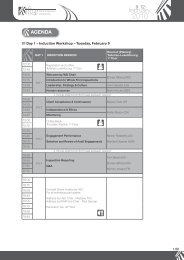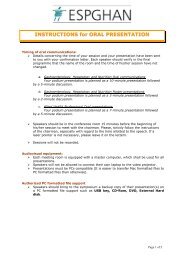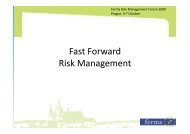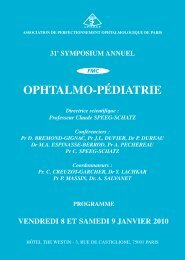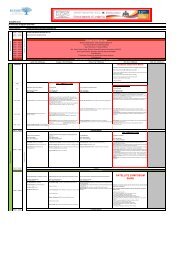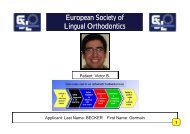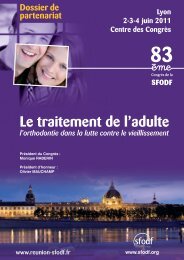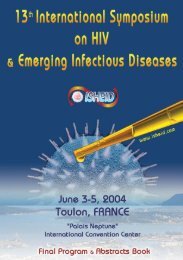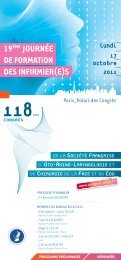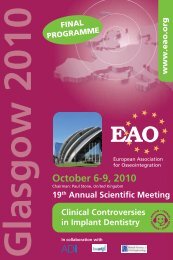final program.qxd - Parallels Plesk Panel
final program.qxd - Parallels Plesk Panel
final program.qxd - Parallels Plesk Panel
You also want an ePaper? Increase the reach of your titles
YUMPU automatically turns print PDFs into web optimized ePapers that Google loves.
PP 4.7<br />
Telephone-Based Coping Improvement Group Intervention for Persons 50 Years of<br />
Age or Older Living with HIV/AIDS in the United States<br />
Timothy G. Heckman<br />
Department of Psychology - Ohio University, Athens, OH 45701, USA<br />
Objectives: Through December 2003, more than 57,000 persons in the United States were<br />
55 years of age or older when they were diagnosed with AIDS. Historically, older adults<br />
have accounted for approximately 10% of all AIDS cases in the United States. However,<br />
it is now believed that 28% of all persons currently living with AIDS in the U.S. are 50-plus<br />
years of age. As the population of older adults living with HIV disease continues to<br />
increase, mental health interventions are urgently needed for this group. In response to<br />
this need, this research examined if a coping improvement group intervention delivered<br />
via teleconference technology could facilitate the adjustment efforts of 90 persons 50-plus<br />
years of age living with HIV/AIDS who were diagnosed with depression.<br />
Methods: The 90 study participants (mean age=54.4 years; 52% White; 62% Male) were<br />
recruited through non-governmental organizations (NGOs) in Pittsburgh, PA; Cincinnati,<br />
OH; Buffalo, NY; and Phoenix, AZ. Recruitment materials were distributed to participants<br />
via mail, home visits, and placement in high traffic areas of NGOs. The study used a<br />
lagged treatment, control group design, in which 44 participants were assigned to an<br />
"Immediate Intervention" condition and 46 to a "Delayed Treatment" condition. Immediate<br />
Treatment participants completed a pre-intervention assessment, received the<br />
intervention, and completed post-intervention and 3-month follow-up assessments.<br />
Delayed Treatment participants completed two pre-intervention assessments, received<br />
the intervention, and then completed a post-intervention assessment. Self-administered<br />
surveys assessed participants' depressive and psychological symptoms, life-stressor<br />
burden, social support, ways of coping, and coping self-efficacy. The telephone-delivered,<br />
12-session coping improvement group intervention was guided by Lazarus and Folkman's<br />
Transactional Model of Stress and Coping and used cognitive-behavioral strategies to<br />
improve participants' skills in stress appraisal, coping decisions, and obtaining social<br />
support.<br />
Results: ANCOVA using intent-to-treat strategies indicated that, relative to Delayed<br />
Treatment participants, Immediate Treatment participants reported greater reductions in<br />
psychological symptoms (p < .08), life-stressor burden (p < .06), and use of avoidant<br />
coping and significant increases in coping self-efficacy (p < .07). Immediate Treatment<br />
participants maintained these changes at 3-month follow-up. Within-group analyses<br />
indicated that, after receiving the intervention, Delayed Treatment participants reported<br />
significant reductions in psychological symptoms (p < .08) and life-stressor burden<br />
(p < .05) and increases in coping self-efficacy (p < .01). A series of post-hoc multiple<br />
regression analyses were conducted to determine if intervention-related increases in<br />
coping self-efficacy and reductions in avoidant coping mediated Immediate Treatment<br />
participants' changes in psychological symptoms and life-stressor burden. These analyses<br />
indicated that participants' increases in coping self-efficacy (and not decreases in the use<br />
of avoidance coping) were responsible for much of the reduction in participants'<br />
psychological symptomatology and perceptions of life stress.<br />
Conclusions: Data from this preliminary randomized clinical trial provide initial evidence<br />
that psychological well-being and coping self-efficacy can be improved in HIV-infected<br />
older adults through participation in an age-appropriate, telephone-delivered, coping<br />
improvement group intervention. Future research evaluating this intervention approach<br />
should be conducted with larger and more geographically-diverse samples of older adults<br />
living with HIV/AIDS.<br />
“ Focusing FIRST on PEOPLE “ 188 w w w . i s h e i d . c o m




